Palestinian President Mahmoud Abbas gestures as he talks during the closing news conference following the Organisation of Islamic Cooperation's Extraordinary Summit in Istanbul, Wednesday, Dec. 13, 2017. Muslim nations of the 57-member Organisation of Islamic Cooperation are rejecting U.S. President Donald Trump's declaration of Jerusalem as the capital of Israel, and appear set to counter it with a declaration of east Jerusalem as the capital of a future Palestinian state. (Onur Coban/Pool Photo via AP)
The Associated Press
ISTANBUL (AP) - Breaking with years of courting the U.S., Palestinian President Mahmoud Abbas called Wednesday for the United Nations to replace Washington as a Mideast mediator and suggested he might not cooperate with the Trump administration's much-anticipated effort to hammer out an Israeli-Palestinian peace deal.
At a summit in Turkey, Arab and Muslim leaders "rejected and condemned" President Donald Trump's recognition of Jerusalem as Israel's capital - the trigger for Abbas' sharp policy pivot - but stopped short of backing his more combative approach toward Washington.
A possible Palestinian refusal to engage with the U.S. and growing backlash against Trump's shift on Jerusalem, including from Arab allies, cast new doubt over the administration's already seemingly remote chances of brokering a deal and succeeding where its predecessors have failed.
A senior White House official said the administration will continue to work on a Mideast plan "that we hope will offer the best outcome for both peoples" and will present it when the time is right. The official spoke on condition of anonymity in advance of an expected public statement later Wednesday.
In seemingly shunning the U.S., Abbas finds himself in uncharted territory.
He does not have an immediate practical alternative to more than two decades of U.S.-led negotiations on the terms of Palestinian statehood. The Palestinians seek such a state on lands captured by Israel in the 1967 Mideast war - the West Bank, Gaza Strip and east Jerusalem.
On the other hand, Trump's recognition of Jerusalem as Israel's capital was decried by Palestinians and others in the region as a provocative show of pro-Israel bias, making it difficult for Abbas to justify dealing with Washington as a mediator.
Trump's argument that his announcement does not mean an endorsement of specific boundaries of Israeli sovereignty in Jerusalem has not gained traction in the ensuing uproar.
The fate of Jerusalem is a hot-button issue in the region, and even the leaders of Saudi Arabia and Egypt - reportedly eager to help advance Trump's Mideast efforts - cannot afford to be seen as soft on the religious claims of Muslims and political claims of Palestinians to the contested city. Israeli-annexed east Jerusalem is home to Islam's third-holiest shrine, along with the most revered site in Judaism and a major Christian church.
Wednesday's extraordinary summit of the 57-member Organization of Islamic Cooperation ended with a call on Trump to rescind an "unlawful decision that might trigger chaos in the region" and on the world to recognize east Jerusalem as the capital of a state of Palestine.
The final statement lacked tougher criticism of U.S. policy contained in an earlier draft, which questioned Washington's continued role as a Mideast mediator and warned that Trump's shift on Jerusalem threatened global security.
Turkish President Recep Tayyip Erdogan, who hosted the summit, stuck to the harder line, saying at a news conference that it is "out of the question" for Washington to continue mediating between Israel and the Palestinians.
"That process is now over," he said.
Abbas' speech marked a high-profile break with what had been his unwavering policy in more than a decade as Palestinian leader.
Despite setbacks, he had considered a close relationship with the U.S. the centerpiece of his efforts to win Palestinian statehood through negotiations.
When Trump was elected a year ago, Abbas went out of his way not to criticize the new president, for fear of harming the relationship.
On Wednesday, he expressed a sense of betrayal.
"We were shocked by the U.S. administration," Abbas said. "While we engaged with them in the peace process for the sake of a deal for the ages, (Trump) delivered a slap for the ages."
Abbas said the United States has disqualified itself as a mediator. "We will no longer accept that it has a role in the political process," Abbas said.
The Palestinian leader said he remains committed to a two-state solution but that he would push for the U.N. to assume responsibility and "find a new mechanism" for resolving the conflict.
In another sign of a harder Palestinian stance, Abbas aides said earlier this week that he would not meet with Mike Pence when the U.S. vice president visits the region, starting this weekend.
Abbas was initially to have hosted Pence, a devout Christian, in the biblical West Bank town of Bethlehem, following the vice president's visit to Israel.
Trump's nod to Israel on Jerusalem came at a time of mounting speculation about the terms of an Israeli-Palestinian deal the U.S. might propose.
Palestinian officials have said they have not heard anything official from the U.S. team led by Trump son-in-law Jared Kushner or from the powerful Saudi crown prince who met Abbas last month.
Saudi Arabia did not participate in a high-level capacity in Wednesday's summit.
But in Riyadh, King Salman and his heir met Wednesday with Abu Dhabi Crown Prince Mohammed bin Zayed Al Nahyan, who also leads the United Arab Emirates' armed forces. A statement said they discussed "the serious repercussions of the negative decision of the U.S. to recognize Jerusalem as the capital of Israel."
In Israel, Prime Minister Benjamin Netanyahu appeared to criticize Abbas' comments, though he did not directly refer to the Palestinian leader.
Netanyahu said in a speech Wednesday that Palestinians should "work for peace and not for extremism."
"All of these declarations do not impress us," Netanyahu said.
He said Israel is committed to protecting the freedom of worship for all religions in Jerusalem, but reaffirmed Israel's claims to the entire city.
Israel has considered Jerusalem its capital since the state's establishment in 1948 and sees the city as the ancient capital of the Jewish people
Israel captured east Jerusalem in 1967 and annexed it to its capital, a move not recognized by most of the international community. Over the past 50 years, Israel has cemented its control over the eastern sector, building large settlements there that are now home to more than 200,000 Israelis.
Despite efforts to ensure a large Jewish majority, the share of the Palestinian population in Jerusalem has grown - from 26 percent in 1967 to 37 percent today.
___
Laub reported from Jericho, West Bank. Associated Press writers Sarah El Deeb in Beirut, Josef Federman in Jerusalem, Aya Batrawy in Dubai, Ken Thomas in Washington and Mohammed Daraghmeh in Ramallah, West Bank, contributed to this report.
Turkey's President Recep Tayyip Erdogan, centre, flanked by Jordan's King Abdullah II, left and Palestinian President Mahmoud Abbas, right, gestures following a photo-op prior to the opening session of the Organisation of Islamic Cooperation Extraordinary Summit in Istanbul, Wednesday, Dec. 13, 2017 Leaders and top officials from Islamic nations, members of 57-member Organization of Islamic Cooperation gathered for a summit that is expected to forge a unified stance against U.S. President Donald Trump's recognition of Jerusalem as the capital of Israel. (AP Photo/Lefteris Pitarakis)
The Associated Press
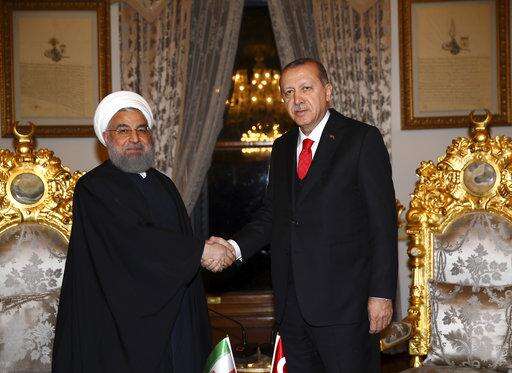
Turkey's President Recep Tayyip Erdogan, right, shakes hands with Iran's President Hassan Rouhani, left, prior to their meeting, following the Organisation of Islamic Cooperation Extraordinary Summit in Istanbul, Wednesday, Dec. 13, 2017. Muslim nations of the 57-member Organisation of Islamic Cooperation are rejecting U.S. President Donald Trump's declaration of Jerusalem as the capital of Israel, and appear set to counter it with a declaration of east Jerusalem as the capital of a future Palestinian state. (Kayhan Ozer/Pool Photo via AP)
The Associated Press
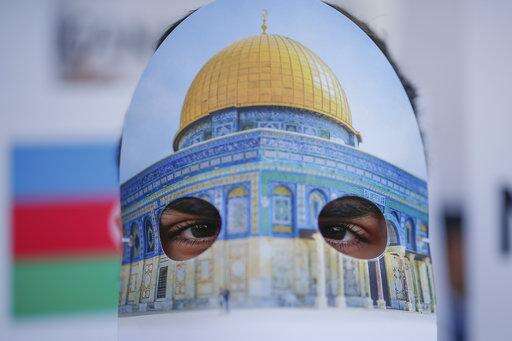
Protesters wearing masks with Jerusalem's Dome of the Rock Mosque, participate in a rally against U.S. President Donald Trump's decision to recognise Jerusalem at the capital of Israel, near the venue of Organisation of Islamic Cooperation's Extraordinary Summit in Istanbul, Wednesday, Dec. 13, 2017. Leaders and top officials from Islamic nations, members of 57-member Organization of Islamic Cooperation gathered for a summit that is expected to forge a unified stance against U.S. President Donald Trump's recognition of Jerusalem as the capital of Israel. (AP Photo/Emrah Gurel)
The Associated Press
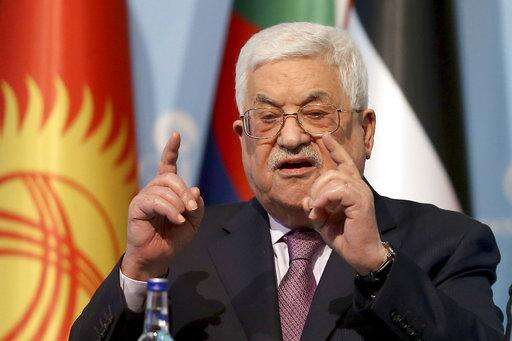
Palestinian President Mahmoud Abbas gestures as he talks during the closing news conference following the Organisation of Islamic Cooperation's Extraordinary Summit in Istanbul, Wednesday, Dec. 13, 2017. Muslim nations of the 57-member Organisation of Islamic Cooperation are rejecting U.S. President Donald Trump's declaration of Jerusalem as the capital of Israel, and appear set to counter it with a declaration of east Jerusalem as the capital of a future Palestinian state. (Onur Coban/Pool Photo via AP)
The Associated Press
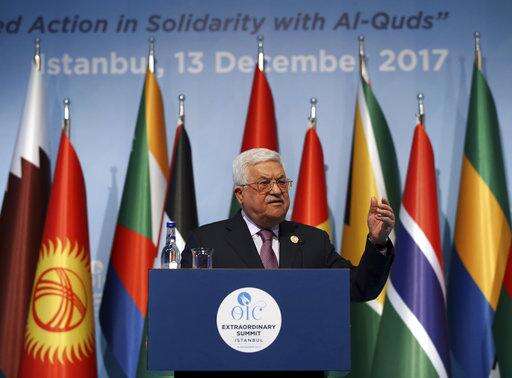
Palestinian President Mahmoud Abbas gestures as he talks during the closing news conference following the Organisation of Islamic Cooperation's Extraordinary Summit in Istanbul, Wednesday, Dec. 13, 2017. Muslim nations of the 57-member Organisation of Islamic Cooperation are rejecting U.S. President Donald Trump's declaration of Jerusalem as the capital of Israel, and appear set to counter it with a declaration of east Jerusalem as the capital of a future Palestinian state. (Yasin Bulbul/Pool Photo via AP)
The Associated Press
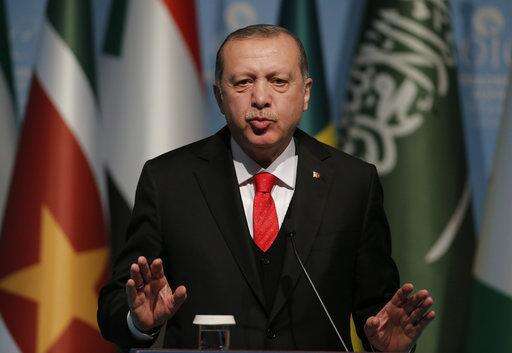
Turkey's President Recep Tayyip Erdogan gestures as he talks during the closing news conference following the Organisation of Islamic Cooperation's Extraordinary Summit in Istanbul, Wednesday, Dec. 13, 2017. Muslim nations of the 57-member Organisation of Islamic Cooperation are rejecting U.S. President Donald Trump's declaration of Jerusalem as the capital of Israel, and appear set to counter it with a declaration of east Jerusalem as the capital of a future Palestinian state. (AP Photo/Emrah Gurel)
The Associated Press
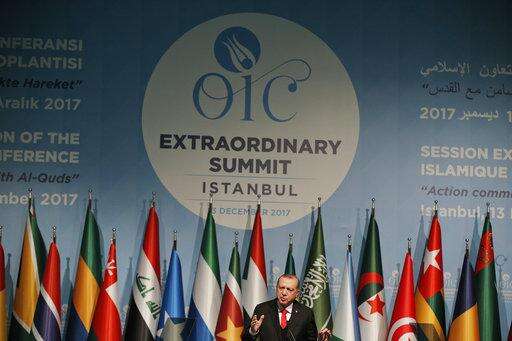
Turkey's President Recep Tayyip Erdogan talks during the closing news conference following the Organisation of Islamic Cooperation's Extraordinary Summit in Istanbul, Wednesday, Dec. 13, 2017. Muslim nations of the 57-member Organisation of Islamic Cooperation are rejecting U.S. President Donald Trump's declaration of Jerusalem as the capital of Israel, and appear set to counter it with a declaration of east Jerusalem as the capital of a future Palestinian state. (AP Photo/Emrah Gurel)
The Associated Press
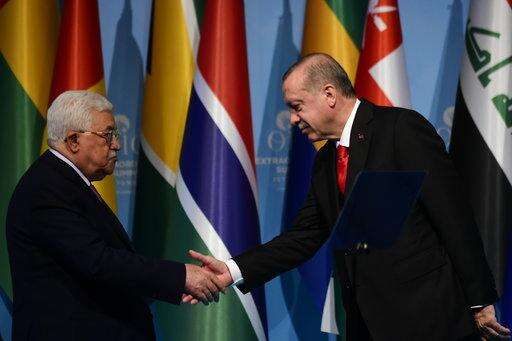
Turkey's President Recep Tayyip Erdogan, right, shakes hands with Palestinian President Mahmoud Abbas, left, following the closing news conference after the Organisation of Islamic Cooperation's Extraordinary Summit in Istanbul, Wednesday, Dec. 13, 2017. Muslim nations of the 57-member Organisation of Islamic Cooperation are rejecting U.S. President Donald Trump's declaration of Jerusalem as the capital of Israel, and appear set to counter it with a declaration of east Jerusalem as the capital of a future Palestinian state. (AP Photo)
The Associated Press
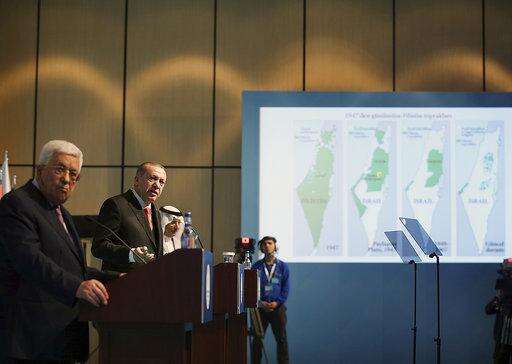
Backdropped by a map of Israel and Palestine, Turkey's President Recep Tayyip Erdogan, 2nd left, talks during the closing news conference as Palestinian President Mahmoud Abbas, left, listens after the Organisation of Islamic Cooperation's Extraordinary Summit in Istanbul, Wednesday, Dec. 13, 2017. Muslim nations of the 57-member Organisation of Islamic Cooperation are rejecting U.S. President Donald Trump's declaration of Jerusalem as the capital of Israel, and appear set to counter it with a declaration of east Jerusalem as the capital of a future Palestinian state. (Yasin Bulbul/Pool Photo via AP)
The Associated Press
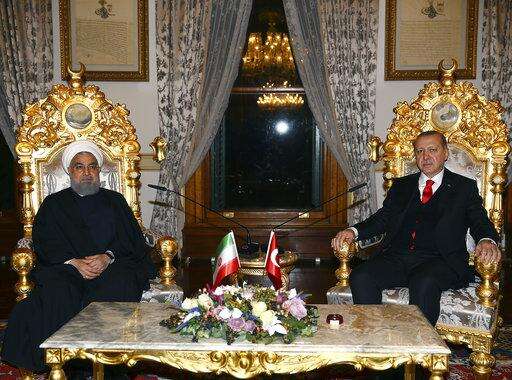
Turkey's President Recep Tayyip Erdogan, right, sits with Iran's President Hassan Rouhani, left, prior to their meeting, following the Organisation of Islamic Cooperation Extraordinary Summit in Istanbul, Wednesday, Dec. 13, 2017. Muslim nations of the 57-member Organisation of Islamic Cooperation are rejecting U.S. President Donald Trump's declaration of Jerusalem as the capital of Israel, and appear set to counter it with a declaration of east Jerusalem as the capital of a future Palestinian state. (Kayhan Ozer/Pool Photo via AP)
The Associated Press
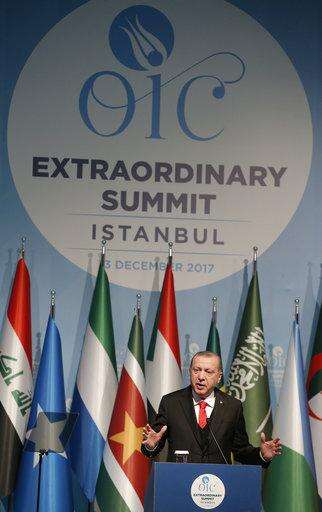
Turkey's President Recep Tayyip Erdogan gestures as he talks during the closing news conference following the Organisation of Islamic Cooperation's Extraordinary Summit in Istanbul, Wednesday, Dec. 13, 2017. Muslim nations of the 57-member Organisation of Islamic Cooperation are rejecting U.S. President Donald Trump's declaration of Jerusalem as the capital of Israel, and appear set to counter it with a declaration of east Jerusalem as the capital of a future Palestinian state. (AP Photo/Emrah Gurel)
The Associated Press
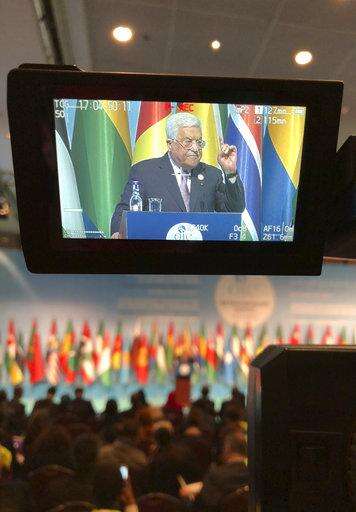
Palestinian President Mahmoud Abbas is seen on a camera's monitor during the closing news conference following the Organisation of Islamic Cooperation's Extraordinary Summit in Istanbul, Wednesday, Dec. 13, 2017. Muslim nations of the 57-member Organisation of Islamic Cooperation are rejecting U.S. President Donald Trump's declaration of Jerusalem as the capital of Israel, and appear set to counter it with a declaration of east Jerusalem as the capital of a future Palestinian state. (AP Photo/Mehmet Guzel)
The Associated Press
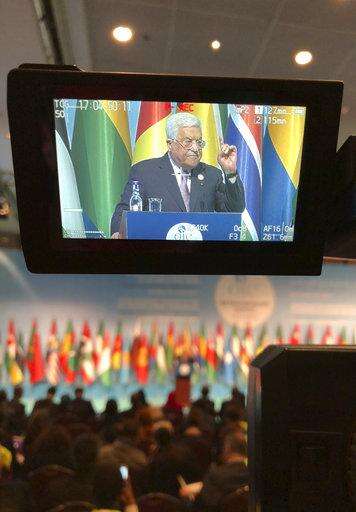
Palestinian President Mahmoud Abbas is seen on a camera's monitor during the closing news conference following the Organisation of Islamic Cooperation's Extraordinary Summit in Istanbul, Wednesday, Dec. 13, 2017. Muslim nations of the 57-member Organisation of Islamic Cooperation are rejecting U.S. President Donald Trump's declaration of Jerusalem as the capital of Israel, and appear set to counter it with a declaration of east Jerusalem as the capital of a future Palestinian state. (AP Photo/Mehmet Guzel)
The Associated Press
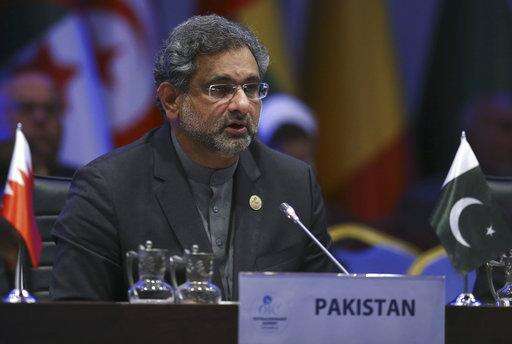
Pakistan's Prime Minister Shahid Khaqan Abbasi addresses the Organisation of Islamic Cooperation's Extraordinary Summit in Istanbul, Wednesday, Dec. 13, 2017. Muslim nations of the 57-member Organisation of Islamic Cooperation are rejecting U.S. President Donald Trump's declaration of Jerusalem as the capital of Israel, and appear set to counter it with a declaration of east Jerusalem as the capital of a future Palestinian state. (Emrah Yorulmaz/Pool Photo via AP)
The Associated Press
Iran's President Hassan Rouhani attends the Organisation of Islamic Cooperation's Extraordinary Summit in Istanbul, Wednesday, Dec. 13, 2017. Muslim nations of the 57-member Organisation of Islamic Cooperation are rejecting U.S. President Donald Trump's declaration of Jerusalem as the capital of Israel, and appear set to counter it with a declaration of east Jerusalem as the capital of a future Palestinian state. (Emrah Yorulmaz/Pool Photo via AP)
The Associated Press
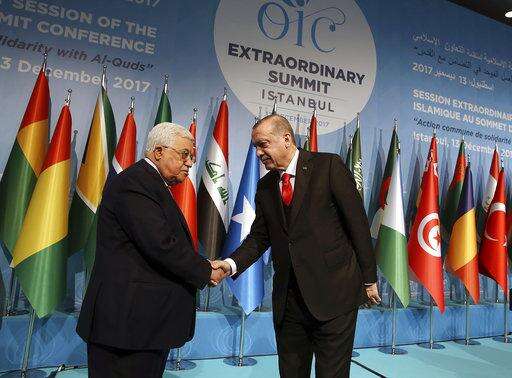
Turkey's President Recep Tayyip Erdogan, right, shakes hands with Palestinian President Mahmoud Abbas, left, following the closing news conference after the Organisation of Islamic Cooperation's Extraordinary Summit in Istanbul, Wednesday, Dec. 13, 2017. Muslim nations of the 57-member Organisation of Islamic Cooperation are rejecting U.S. President Donald Trump's declaration of Jerusalem as the capital of Israel, and appear set to counter it with a declaration of east Jerusalem as the capital of a future Palestinian state. (Yasin Bulbul/Pool Photo via AP)
The Associated Press